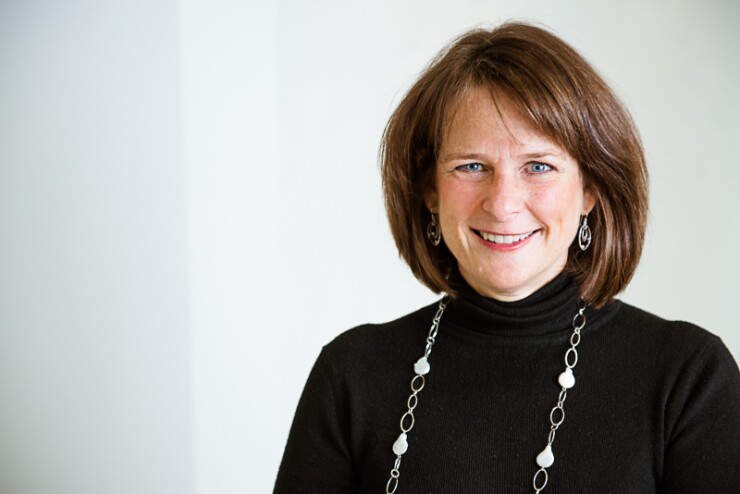Want unlimited access to top ideas and insights?
As the chief executive of Green Dot Bank, Mary Dent’s career has taken many turns to get to where she is today — from lawyer to executive to board member and, finally, to CEO. But one specific piece of advice stands out from early on in her career.
“I was on vacation with my husband and 1-year-old son, and work was intruding in an impossible, overwhelming way," Dent said. "I called my boss, exhausted and despairing, and told him, 'I can’t possibly do this.' And he said something I’ve never forgotten: 'Then don’t.' "

Those two words provided a valuable form of perspective and, ultimately, motivation.
“ 'You’re a smart person,' he said. 'If you can’t do this, then decide what you can do, and do that,'" Dent continued. "It’s easy to fall into the trap of flailing in the face of what’s not possible. But it’s been transformative to instead relentlessly force myself to see what’s possible, to believe in myself, and to keep moving forward."
Prepaid card marketers like Green Dot Corp. don't typically issue the cards they sell. At Green Dot, this changed when the company bought Bonneville Bancorp in Provo, Utah, in 2011. This set the foundation for creating Green Dot Bank, which has allowed the company to offer more inventive products such as a mobile bank account called GoBank.
For an institution that has been traditionally associated with the prepaid card business, Dent’s lens on the payments world is far greater than Green Dot’s main area of focus. In fact, she sees some of the greatest innovation in payments to be happening outside of payments.
“Uber transformed payments by transforming the riding experience," she said. "Apple Pay Cash is changing sending money into sending a text. PayPal and Amazon are using one-touch and user authentication to make payments [seem to] disappear. While surprising, it also makes perfect sense — focusing on the consumer’s underlying desire, and removing all payment friction between the consumer and that desire, is a faster and better path to transformation.”
Conversely, Dent sees legacy financial structures as a restrictive factor on innovation in such areas as blockchain technologies. She likened the modern financial system to the telecoms before the internet.
"Just as the Internet transformed commerce and communications, an open, flat, global blockchain platform could transform payments," Dent said. "But to unleash the platform’s full potential, we need to do two things: One, we need advocates for, and guardians of, an open, technology-centric, internet-like global governance structure for blockchain technology platforms. And two, we need to clearly separate the regulatory regime governing blockchain platforms from the regulatory regime governing the financial services that sit on top of those platforms."
It's important for women to encourage other women to take on leadership roles — so important, Dent says, that she would be doing just that even if she didn't have her job at Green Dot.
“I’d be a coach for women who are transforming themselves from 'doer' to 'leader,'" she said. "For the first few decades of our careers, professionals focus on substantive expertise. But at some point, being an expert is no longer the source of differentiation, it’s the price of admission. Work shifts from doing to leading, from tasks to outcomes."
It's a change that many people can find disorienting, Dent said. "Things that worked before suddenly stop working. Strengths can become weaknesses. How others perceive us can vary dramatically from how we perceive ourselves.”
Dent found mentors in her own career who helped her with that transition, and given the opportunity she wants to serve that same role for other women.
“I plan to focus specifically on women, since that’s my own experience," she said. "I think women face unique challenges, often lack deep networks to turn to for support, may internalize the struggle as a personal failing, and typically have the option to drop out. I want to help them stay in the fight and emerge from their transformation as confident, effective, and happy leaders.”
READ MORE:





